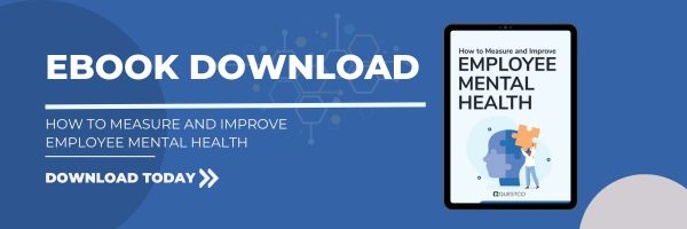Topic Mental Health Awareness
From Stigma to Support: Crafting Compelling Mental Health Awareness Messaging

May 19, 2023 | By Questco Companies

The mental health of employees directly influences the overall success of an organization. So, with Mental Health Awareness Month upon us, employers should take a proactive and committed role in fostering awareness and providing essential support to their employees.
A powerful mental health awareness message has the potential to not only engage employees but also create a supportive and empathetic environment where they feel understood and valued.
By nurturing a culture of open communication and inclusivity, employers can dismantle mental health stigma and inspire employees to seek assistance when necessary. In this article, we will delve into what makes for an impactful mental health awareness message.
Components of a Compelling Mental Health Awareness Message
To create a compelling mental health awareness message, employers must first establish a clear purpose and set specific objectives for their communication. This foundation enables employees to understand the motivation behind the message and appreciate the employer’s commitment to their well-being. A well-defined purpose also guides the content and tone of the message, ensuring that it effectively addresses the targeted mental health concerns and encourages open dialogue within the organization.
Perhaps the most essential part of a mental health awareness message is using empathetic and inclusive language. By choosing words that express understanding, compassion, and support, employers can connect with their employees on a deeper level and foster a sense of belonging. This approach helps create a safe space for employees to share their experiences and feel comfortable discussing mental health without fear of judgment or negative consequences.
Consider incorporating relevant facts and statistics into the message to provide valuable context and demonstrate the employer’s awareness of the prevalence and impact of mental health issues.
By presenting evidence-based information, employers can effectively challenge misconceptions, increase understanding, and highlight the importance of addressing mental health in the workplace.
In addition, sharing personal stories and testimonials is a powerful way to humanize the topic of mental health and inspire employees to engage with the message. By highlighting the experiences of individuals within the organization or even sharing their own stories, employers can break down barriers and encourage employees to relate and connect.
Finally, a compelling mental health awareness message should include information on available resources and support within the organization. By clearly outlining the tools, services, and initiatives designed to assist employees, employers can empower their workforce to seek help while promoting a proactive approach to mental health management.
However, your mental health messaging will fall flat if it isn’t specific to your organizational culture.
Tailoring Your Message to Your Organization
When you understand the specific challenges your workforce faces, you can develop specific messaging that addresses the most pressing mental health concerns and speaks to the experiences of your employees. This level of customization enhances the effectiveness of your message and demonstrates your genuine commitment to employee well-being.

By gathering data through surveys, focus groups, or Employee Assistance Program utilization reports, you can gain insights into the mental health issues most relevant to your workforce. Armed with this information, you can ensure your mental health awareness message is relevant and impactful.
Collaborate with internal stakeholders for input and feedback to ensure your message is comprehensive, accurate, and inclusive. Engage employees at all levels, including human resources, management, and mental health advocates. Additionally, involving employees in the development process can foster a sense of ownership and encourage buy-in from the entire organization.
That said, mental health messaging also requires careful planning.
Implementing Mental Health Awareness Campaigns
Choosing the right time and frequency for your mental health awareness messages maximizes their impact. By sharing these messages during key moments, such as Mental Health Awareness Month in May or World Mental Health Day, you can capitalize on heightened awareness and create a sense of urgency around the issue.
Beyond these dates, consider incorporating mental health messaging throughout the year to maintain momentum and demonstrate your commitment to employee well-being.
To increase visibility, employ a multi-channel approach, including email, intranet, social media, and even in-person meetings or events. This comprehensive approach helps reinforce your commitment to mental health and encourages employees to actively engage with available resources and support.
Encouraging employee engagement and participation is critical to the success of your mental health awareness campaigns. By inviting employees to share their stories, provide feedback, or even become mental health ambassadors, you can cultivate a sense of ownership and
Conclusion
Crafting compelling mental health awareness messages supports employees and fosters a healthy, productive work environment. Employers can create powerful messages that resonate with their workforce by focusing on clear objectives, using empathetic and inclusive language, incorporating facts and statistics, sharing personal stories, and highlighting available resources.
By consistently evaluating and refining your messaging and strategies, you can contribute to the well-being of your employees, create a more inclusive work environment, and, ultimately, enhance the overall success of your organization.




